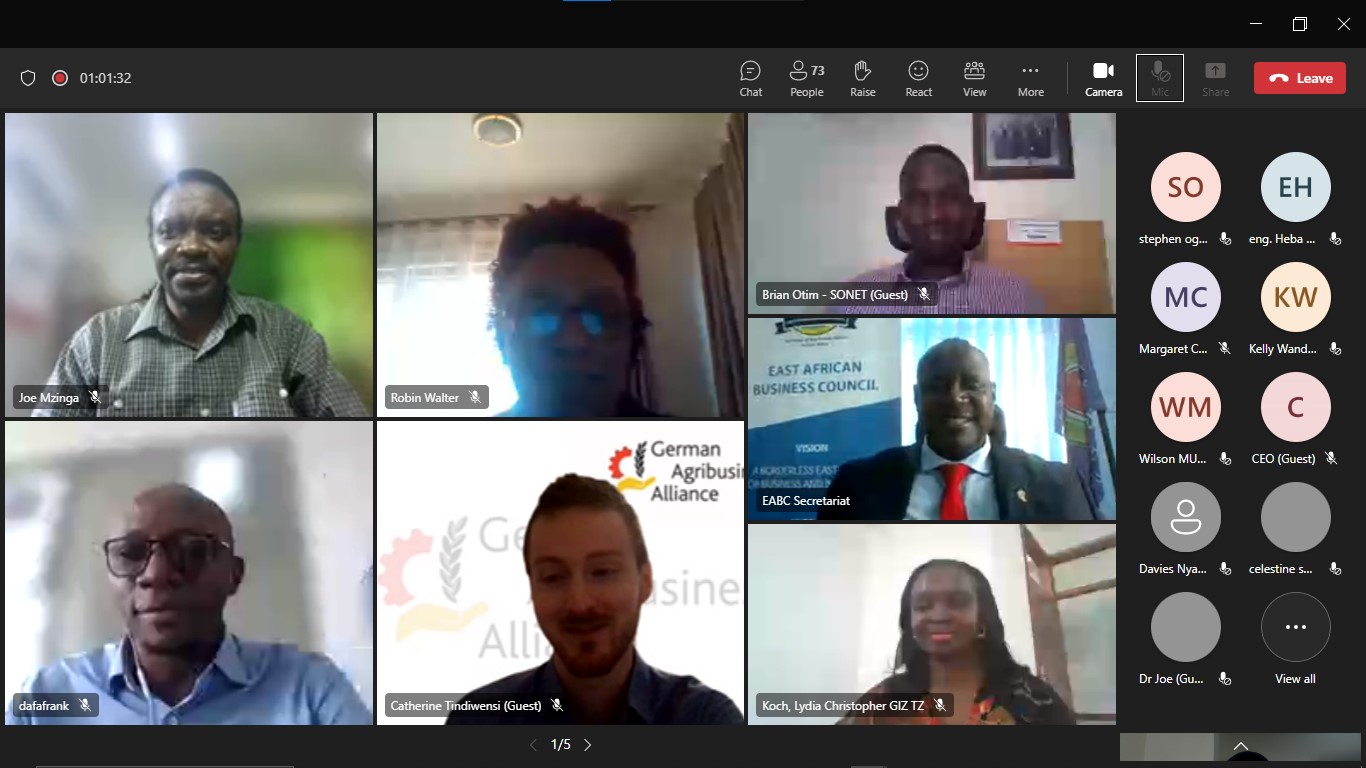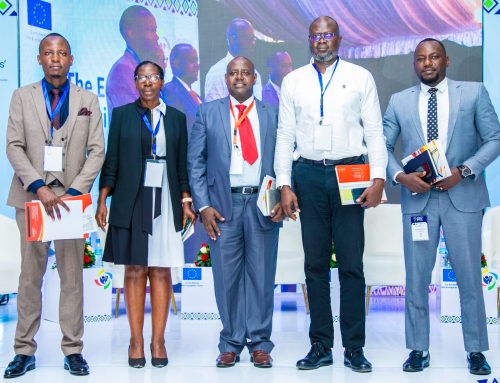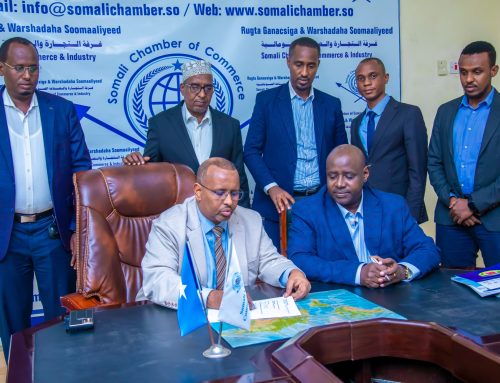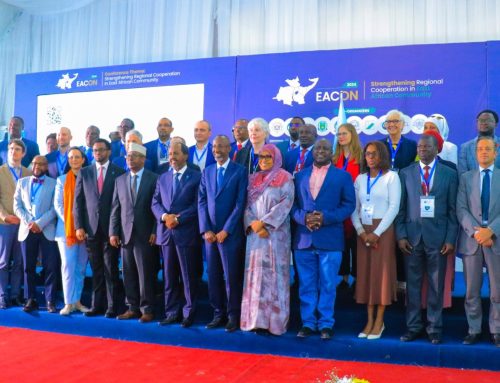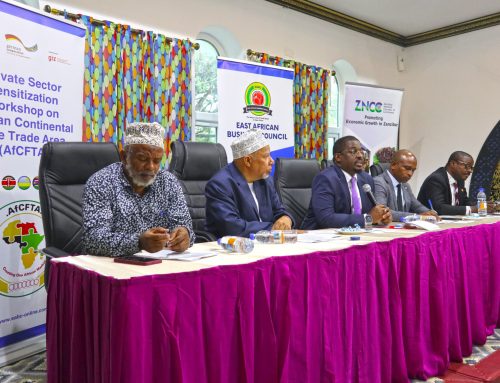15th December 2023
The High-Level e-Conference on “Building a Resilient Agricultural Sector for a Food-Secure EAC Region” was convened by the East African Business Council (EABC) in partnership with GIZ – Sequa gGmbH under the Business Scouts Fund. The conference aimed to address the challenges facing the East African Community (EAC) in achieving food security amidst global crises impacting the agricultural sector.
The e-Conference convened 200 stakeholders, including Members of Parliament, Official from Ministries, Investment Promotion Agencies, and agri-food actors, Women & Youth-led MSMES, traders and experts who deliberated and charted out solutions for a resilient agricultural sector and a food secure EAC regions.
The e-Conference was graced by Mr Jean Baptiste Havugimana, EAC Director of Productive Sectors representing Hon. Dr. Peter Mathuki EAC Secretary General accompanied by Mr. John Bosco Kalisa Executive Director, EABC, Mr. Philipp Glaeser Head of International Component, GIZ Business Scouts for Development who recognized the importance of the agriculture sector to the region’s socio-economic development and called on collaboration among key stakeholders to share knowledge and build capacities to transform productive food systems. EABC and GIZ also launched the Agro-Investment Profiles and Portal www.agro.smesoko.com
The e-Conference appreciated the 23rd Summit of EAC Heads of State for reaffirming their commitment to addressing climate change, food security, including promotion of agricultural sustainable practices, investment in climate-resilient technologies, and development of policies to foster adaptation and strengthening post-harvest handling, value addition, and irrigation
The e-Conference appreciated the lucrative investment opportunities in agricultural value chains of Wheat Grains, Edible oil, Fertilizers, Tubers, and Leguminous plants and fostered Business-to-Business engagement.
The e-Conference endorsed the decisions and commitments of the Africa Food Systems Forum 2023 that highlighted pathways for climate-resilient food systems and called for boosting agricultural yields sustainably, and renewing political commitments to empower women and youth. The Africa Food Systems Forum 2023 emphasized local actions for global impact, confronting climate change, and innovative financing strategies, all centered on fostering resilient, sustainable, and nourishing food systems. The Forum also spotlighted the significance of inclusivity, collaborative actions, trade, and markets, underscoring soil health’s foundational importance and recognizing pivotal government investments.
The e-Conference also endorsed the COP28 UAE Declaration on Sustainable Agriculture, Resilient Food Systems, and Climate Action that stresses urgent global action to combat climate change’s threats to agriculture and food access. Recognised the importance of international cooperation, finance, and multi-stakeholder engagement in addressing climate change in agriculture and food systems and emphasized the integral role of agriculture and food systems in achieving the long-term goals of the Paris Agreement. The Declaration also called for scaling adaptation and resilience activities, promoting food security and nutrition, supporting workers in agriculture, enhancing water management, and maximizing climate and environmental benefits while minimizing harmful impacts in agriculture and food systems and committed to integrating agriculture and food systems into national climate actions and mainstreaming climate action into agriculture policies by 2025.
The e-Conference noted, the East African Community (EAC) grapples with multifaceted challenges in food security, compounded by global crises such as the COVID-19 pandemic and geopolitical conflicts like the Russia-Ukraine war. Preceding the pandemic, only Kenya exhibited a Global Food Security Index (GFSI) score above the average at 50.7 in 2019, closely followed by Rwanda (48.2) and Uganda (46.2). Amidst the pandemic in 2020, Burundi and the Democratic Republic of Congo (DRC) showed improved scores, registering 37 and 40.7, respectively, while Uganda, Rwanda, and Tanzania made strides in their scores in 2022. However, despite improvements, the cost of a healthy diet escalated to an estimated USD 3.367 per person per day in 2020, exacerbating challenges for vulnerable populations. Agriculture contributes variedly to the GDP across EAC countries, ranging from Burundi’s highest at 25.0% to South Sudan’s lowest at 18.5%. These challenges underscore the pressing need to address food security through improved agricultural productivity, intra-regional trade enhancement, and robust policy frameworks to fortify the region’s resilience against global shocks.
The EAC investment climate presents vast opportunities, offering market access to 177.2 million people, strategic positioning, abundant resources, and simplified investment procedures. The economic environment records impressive GDP growth rates across the region. Foreign Direct Investment is increasing, primarily directed towards manufacturing in the DRC, Uganda, Tanzania, and Kenya. The legal framework, encapsulated in the EAC Treaty, aims to create a unified investment area and is part of the COMESA-EAC-SADC Tripartite Free Trade Area.
Noted the growth potential and attraction of investments in agricultural value chains face significant setbacks. These challenges are rooted in low production and productivity, primarily stemming from limited access to modern technology, inadequate infrastructure, and inefficient land utilisation practices. Moreover, inadequate post-harvest management and storage facilities contribute to substantial losses, impacting the quality and quantity of produce available for market distribution. The sector is further hindered by complex trade regulations, limited marketing opportunities, and inconsistent access to markets, constraining both domestic and international expansion.
The High-Level e-Conference on “Building a Resilient Agricultural Sector for a Food-Secure EAC Region made the following resolutions:
Impact of Global Crises on Food Security
- Allocate land to food crops to enhance food access and nutritional value.
- Diversify the food basket by including early-maturing and drought-resistant crops, allocating more land to bananas, potatoes, and other root tubers.
- Prioritize local innovations and incentivize the creation of substitution and diversification options for selected regional food products against major food imports like rice, wheat, and edible oils, which may attract bans.
- Create opportunities for Micro, Small, and Medium Enterprises (MSMEs), youth, women, and large companies engaged in value addition and processing of grains, edible oils, fertilizers, and major staple foods in the region.
- Leverage trade opportunities under regional and continental free trade agreements by providing incentive schemes to support agriculture and food production.
- Invest in value addition, blending, and fortification in local staple foods like millet, cassava, sweet potatoes, etc., to offer alternatives to wheat products, fish, related food products, and fruits.
- Deploy technology such as irrigation, hydroponics, fortification, and mobile apps to monitor food availability, trade, pricing, and information dissemination.
- Adopt high-yielding seed varieties and invest in research, crop husbandry, and extension services.
- Establish food reserves to cushion populations against food shortages.
- Strengthen food systems by scaling up irrigation and distribution infrastructure through additional budget support. This includes irrigation systems, telecommunications, transport, storage facilities, and renewable electricity to support inter/intra-regional trade.
- Implement targeted insurance schemes and ensure access to finance.
- Focus on capacity building and institutional strengthening.
- Enhance food production and trade diversification by broadening agricultural production and expanding intra and extra-regional trade.
- Improve food value chains by supporting farmers in minimizing food waste and enhancing access to nutritious food through streamlined food value chains and investments in post-harvest management systems.
- Establish robust social safety nets to support vulnerable populations and mitigate food insecurity.
- Address inflation and affordability issues by managing inflationary pressures and ensuring sustainable national debt management for adequate agriculture financing.
- Promote inclusiveness in agriculture by addressing gender disparities and ensuring equitable access to resources and opportunities in the agricultural sector.
- Enhance productivity and market access through better inputs, advanced farming techniques, and expanded market access.
- Implement existing frameworks and commitments to address food security at the global, continental, and regional levels.
- Develop and implement regional agricultural policies supporting value addition, production, processing, distribution, consumption, and disposal of food products.
- Harmonize Sanitary and Phytosanitary (SPS) measures across Partner States to facilitate seamless agricultural trade.
- Enhance extension services, including agro-forestry and aquaculture, at all levels.
- Adopt ICT in agriculture.
- Ensure the safety of fertilizers, pesticides, and seeds.
- Recognize small-scale farmers.
- Allocate 10% of the budget through the CAADP for agriculture.
- Control aflatoxins.
- Focus on rural development and extension services.
- Review the EAC Food and Nutrition Strategy 2019-2024.
Investment Opportunities in Agricultural Value Chains
- Technological Access: Partner States, Private Sector, and Development Partners should facilitate broader access to modern farming technologies, including early warning systems, by providing subsidies and similar incentives to farmers.
- Infrastructure Development: Partner States should invest in enhanced infrastructure for improved transportation and storage facilities. Emphasis should be placed on ensuring adequate infrastructure in rural areas, where agriculture is predominant. This includes energy, services (education and health), irrigation, storage, and roads, among others.
- Enhanced Post-Harvest Management: Partner States, Private Sector, and Development Partners should develop and implement efficient post-harvest handling and storage systems to reduce losses.
- Simplified Trade Regulations: Partner States and the Private Sector should streamline trade regulations to facilitate smoother domestic and international trade.
- Market Access Improvement: Partner States and the Private Sector should work towards expanding market access by creating consistent and broader marketing opportunities.
- Full Implementation of EAC Common Market Protocol: Aim for full implementation to attract investments.
- Capacity Building: Provide training and support programs for farmers to enhance productivity and efficiency in using equipment and chemicals. Emphasis should be placed on agroecology to minimize pollution and the use of harmful chemicals.
- Investment Incentives: Partner States should introduce incentives for small-holder farmers to attract investments and stimulate growth within these value chains.
- Public-Private Partnerships: Partner States and the Private Sector should foster collaborations between public and private sectors, provided strong local partners are available to drive innovation and progress.
- Research and Development: Partner States, Private Sector, and Development Partners should invest in quality seeds, resilient products, diet mix, and soil testing kits to develop and adopt cutting-edge technologies for agricultural advancement.
- Policy Implementation and Regular Reviews: Ensure the implementation of existing policies and conduct regular reviews to update them based on the current environment.
- Increased Agriculture Sector Funding: Advocate for increased funding from the National Budget (up to 10%) for the agriculture sector.
- Robust Seed Production and Distribution Systems: Develop strong systems for seed production and distribution.
- Support Effective Farmer Groups and Innovative Platforms: Provide support for the formation of effective farmer groups and innovative platforms.
- Improved Investment Incentives: Enhance investment incentives to attract investors further.
- Support for Financial Inclusion: Provide support for financial inclusion initiatives.
- Strengthened Market Information and Intelligence: Enhance market information and intelligence systems for improved market access.
- Agricultural Insurance Promotion: Promote and finance agricultural insurance.
- Support for Machinery and Digital Applications: Provide financial support for the use of machinery and digital applications.
- Finance for Human Resource Capacity Enhancement: Allocate finances for enhancing human resource capacity.
- Mitigation of Climate Change Effects: Implement measures to mitigate the negative effects of climate change.
- Fostering Strong Institutional Linkages: Strengthen institutional linkages across the sector.
- Enhanced Public-Private Partnerships (PPPs): Strengthen and promote collaborations between the public and private sectors.
- Infrastructure Improvement: Improve infrastructure, including electric power supply, road, and railway networks, to reduce transaction costs.
- Urged all stakeholders to register in the Agro-Investment Profiles and Directory Portal agro.smesoko.com to access Business-to-Business opportunities and profile investment opportunities in the agricultural sector.
The e-Conference extended its appreciation to the East African Community (EAC), the East African Business Council (EABC), the GIZ Business Scouts Fund for Development, the German Agribusiness Alliance (GAA), and the Eastern and Southern Africa Small Scale Farmers’ Forum (ESAFF) and Consultants for their valuable insights and contributions.
Building a resilient agricultural sector for a food secure EAC requires a long-term commitment and a multi-sectoral approach from governments, the private sector, civil society, and development partners. By implementing the outlined strategies across the four pillars of adaptation, innovation, investment, and collaboration, the EAC can ensure food security for its growing population and promote sustainable development in the region.

